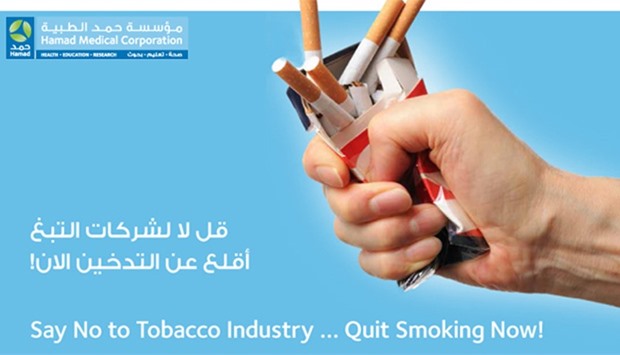“We are planning more awareness campaigns in order to reach a much wider community as well as extend our clinical services to more HMC hospitals within the coming year,” said Dr. Ahmad al-Mulla, senior consultant and head of the Smoking Cessation Clinic, HMC.
According to him, a large number of people who are willing to quit tobacco smoking visited the Smoking Cessation clinic during this year’s Ramadan.
“We have received around 200 new visitors seeking to quit tobacco use at our clinic during Ramadan. Usually, the number of people who are motivated to quit smoking increases in Ramadan because fasting requires abstinence from smoking in addition to refraining from food and drink during the day. So the figure we have recorded for this year is almost similar to previous years in Ramadan,” stated Dr al-Mulla.
Dr. al-Mulla explained that nicotine, which is the addictive substance in tobacco products, is as addictive as any other hard drug such as cocaine and heroin. He stressed further that carbon monoxide - another component of tobacco products is a poisonous gas emitted from tobacco smoking.
Acknowledging that it is difficult for many people to quit smoking, Dr. al-Mulla encouraged seeking professional help, through HMC’s Smoking Cessation Clinic or primary healthcare centres, where patients can obtain advice, treatment and support from specialists to enable them quit smoking permanently.
The Smoking Cessation Clinic at HMC provides patients with ways to replace their nicotine consumption and cope with withdrawal symptoms, and supports patients throughout the process of quitting.
“Quitting smoking has various health benefits for a healthy individual and also for those with chronic conditions such as diabetes. For the diabetic, quitting smoking can result in improved blood sugar levels and blood circulation, increased insulin reception, decreased cholesterol levels, and decreased complications,” said Dr. al-Mulla.
Exercising, drinking plenty of water and staying away from smokers are some steps that people can take to decrease the urge to smoke, according to Dr. al-Mulla. Avoiding places such as shisha cafes and other areas frequented by smokers will also help prevent inhaling second hand smoke which is responsible for heart and respiratory diseases.
Tar inhaled during smoking constitutes the main agent of causing several types of cancers. “Cigarette smoke contains more than 45 poisonous chemicals that can cause cancer,” said Dr. al-Mulla.
According to him, the Smoking Cessation Clinic has held a number of interventional programmes and introduced initiatives for encouraging smokers to quit.
“In addition to one-on-one counselling that we usually hold for persons willing to stop smoking, we also prescribe suitable medications that will help them cope and remain committed to quitting. We have also organised public awareness campaigns and lectures to highlight the dangers of smoking and advised on methods to quit,” he said.

